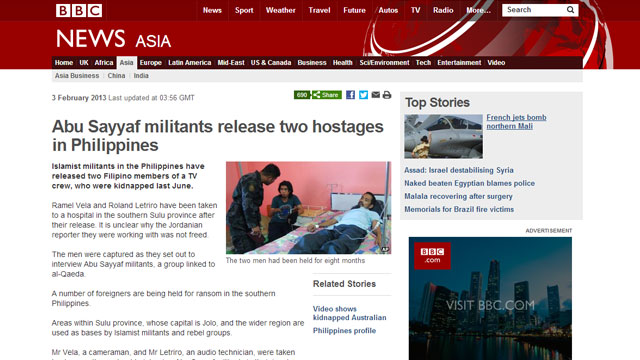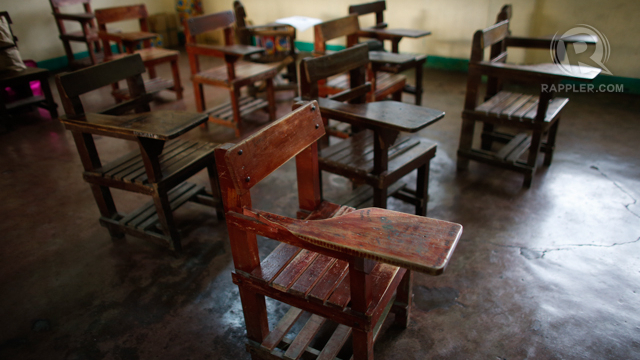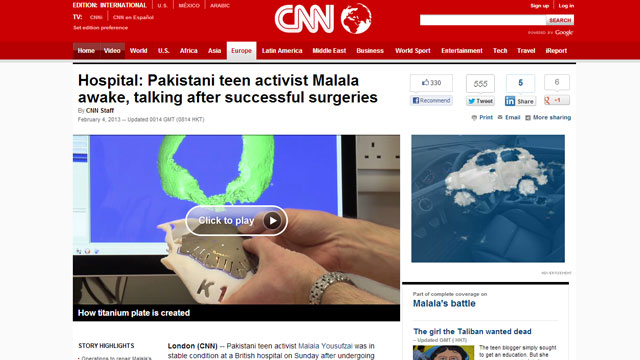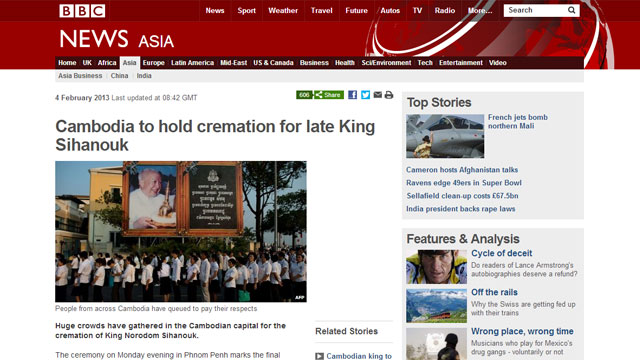SUMMARY
This is AI generated summarization, which may have errors. For context, always refer to the full article.
- Abu Sayyaf free 2 Filipino hostages

After close to 8 months in captivity, the Filipino crew of Jordanian journalist Baker Atyani were released Saturday night, February 2, in Sulu, local and intelligence officials said. Cameraman Ramil Vela and audio technician Roland Letrero were released by the Abu Sayyaf Group at around 7 pm, but there was no word about Atyani himself. Jolo provincial police chief Roy Gabor quoted the two as saying they went through so much difficulty. “We didn’t know whether we would make it out alive.” Said to be separated from Atyani on the 5th day of their captivity, the two were allowed to leave the jungle and were given a horse. Owing to a swollen leg, Vela could not walk. They made it to a highway, took a tricycle to Jolo’s main port, and went to a hotel where they sought help. The two were brought to the Anti-Kidnapping headquarters in Camp Crame late Monday morning. Besides Atyani, at least 4 other foreigners are believed to be held by the ASG and other armed groups – a Dutch, Swiss, Australian, and Japanese.
Read the full story on Rappler.
Additional details are on BBC.
The story about their arrival in Manila is on Rappler. - US will pay for Tubbataha damage

The US is “prepared to provide appropriate compensation to the Republic of the Philippines,” an official statement from the US embassy said on Sunday, February 3. How much exactly will be paid will be determined only after the USS Guardian, the naval minesweeper that ran aground in Tubbataha Reef Natural Park, is pulled out and an extensive damage assessment is made. The US Navy’s salvage plan of cutting the ship into sections before transferring sections to a barge has yet to be approved by the Coast Guard. The dismantling plan is intended to minimize further damage to the coral in Tubbataha, declared a protected area and World Heritage site by Unesco. At least 17 meters of the hull are said to be stuck in the reef and have damaged about 1,600 square meters of coral, initial estimates said. The vessel has remained grounded since January 17 and park officials are anxious for it to be extricated to prevent further damage.
Read the full story on Rappler.
A related story on the US Navy’s plan to dismantle the USS Guardian is also on Rappler. - Comelec mock elections get poor turnout

Low public interest characterized the mock elections held by the Commission on Elections Saturday, February 2, even as only a few glitches were reported from the field. Comelec Chair Sixto Brillantes Jr saw for himself how a ballot-counting machine, the precinct count optical scan, rejected the first 3 ballots. The machine was eventually replaced with a contingency machine after a technical team confirmed a glitch. Voter turnout was lower than expected in select precincts in Quezon City, hitting less than 20%. Up to 2,500 were expected to try out the voting system in preparation for actual elections on May 13. Elsewhere such as in Dumaguete, various precincts encountered delays in transmitting results to designated servers. These were traced to poor signals and power interruptions. Overall, the Comelec said the mock polls went smoothly.
Read the full story on Rappler.
A related story on Dumaguete mock polls is also on Rappler.
The story on how the mock elections went at the University of the Philippines Integrated School is on Rappler. - Genetically modified rice coming to PH

Farmers in the Philippines will soon be planting golden rice, a genetically modified (GM) crop, that can boost vitamin A levels, reduce blindness, and counter diseases. Bangladesh and Indonesia, according to the Guardian, have indicated they will follow in the footsteps of the Philippines. India has said it is considering planting the GM crop. First developed in 1999, its development has been opposed by protesters who have argued that “its introduction in the developing world would make farmers dependent on Western industry,” the Guardian said. But scientists have countered that it is a way to alleviate real health problems in the developing world. Biologists in Germany and Switzerland who created golden rice inserted genes of a chemical known as beta-carotene into the DNA of normal rice to stimulate vitamin A production in the body. Studies have demolished claims by Greenpeace that several kilograms of golden rice would have to be eaten to get any benefit. But the debate continues.
Read the full story in The Guardian. - Obama goes skeet shooting

The White House on Saturday, February 3, released and pushed a photo of President Barack Obama shooting skeet in Camp David, the presidential retreat in Maryland. The photo shows Obama in jeans, wearing sunglasses, and firing a shotgun wedged against his left shoulder. It was seen as an attempt by White House aides to end distractions coming from his critics who were skeptical about claims he was a skeet or clay target shooter. Obama is set to rally public support for his agenda to tighten gun laws. Skeet shooting is a sport that originated early in the 20th century when hunters were looking for ways to improve their marksmanship. Clay targets, according to the Washington Post, are launched at different heights and travel across the shooter’s field of vision.
Read the full story in the Washington Post. - Syria’s Assad accuses Israel of destabilization

Syrian President Bashar al-Assad accused Israel of trying to destabilize his country after the Jewish state implicitly confirmed it staged an air strike last week. Israeli Defense Minister Ehud Barak told a security conference in Germany on Sunday, February 3, that the strike was “proof that when we say something we mean it.” Syrian state TV showed the aftermath of the air strike on Jamraya, a military research center northeast of Damascus. US officials said the strike targeted a weapons convoy headed for Lebanon. The BBC reported that footage showed a damaged building and wrecked military vehicles, indicating that it was possible weapons intended for the Hezbollah in Lebanon may have been at the Jamraya research center. “We don’t think [Syria] should be allowed to bring advanced weapons systems into Lebanon,” Barak said.
Read the full story on BBC.
Additional details are on Rappler. - Philippines, Indonesia: Asia’s economic stars

Owing to their impressive economic growth, the Philippines and Indonesia are considered Asia’s rising economic stars. The two Southeast Asian neighbors have defied global economic trends, recording impressive growth rates, hitting historic highs in their stock markets, and attracting foreign direct investments. Business news site Market Watch branded the two countries as “the new tigers” or economies “poised to drive future growth and grab more economic power.” World-renowned economist Nouriel Roubini said he favored the Philippines and Indonesia over China and India, Asia’s other economic powerhouses. The Philippine economy grew 6.6% in 2012, going beyond government’s 5%-6% target. It also registered a 6.8% growth in the 4th quarter. In the 3rd quarter, it hit a growth rate of 7.1% as compared to Indonesia’s 6.2%. At the Philippine Investment Summit, Roubini said an investment grade for the Philippines is “certainly warranted.” Such a grade will encourage more investments and support economic growth.
Read the full story on Rappler. - Malala talking, recovering after surgeries

Pakistani teen activist Malala Yousufzai was reported in stable condition at a British hospital Sunday after successful 5-hour surgeries intended to repair her skull. “She is awake and talking to staff and members of her family,” the Queen Elizabeth Hospital in Birmingham said in a statement. The two operations done on Saturday, February 2, were a success and her medical team is “very pleased” with her progress, the hospital said. The 15-year-old Malala was shot in the head and neck by Taliban gunmen in October 2012 for her crusade in favor of education for Pakistani girls. A titanium plate and cochlear implant were attached in two operations to partially restore hearing in her left ear. The plate was needed to replace a section of her skull, which had to be removed by doctors to relieve swelling after she was shot. Now a symbol of empowerment of young women, Malala will remain hospitalized until she is well enough to be discharged.
Read the full story on CNN.
Other details are available on BBC and Rappler. - Beyonce conquers Super Bowl

Beyonce Knowles’ Super Bowl half-time performance on Sunday laid to rest doubts the 31-year-old singer would give it all she’s got. After using a recorded track when she sang at President Barack Obama’s inauguration in February, many wondered whether she would do the same in the much-anticipated football championship game. Instead she gave an explosive performance that featured a reunion with her Destiny’s Child bandmates at the Mercedes Benz Superdome in New Orleans. She began solo with an a capella version of “Love in Top” then strutted to “Crazy in Love.” She closed the 12-minute performance with Destiny’s Child, singing solo, “Halo.” The championship match was won by the Baltimore Ravens who defeated the San Francisco 49ers, 34-31.
Read the full story on CNN.
Additional details about the game are on Rappler. Video of the Beyonce performance are also on Rappler. - Huge crowd gathers for Sihanouk cremation

Huge crowds gathered in Phnom Penh for the cremation Monday evening of King Norodom Sihanouk, former monarch of Cambodia. The cremation ceremony marks the end of commemorations in Cambodia of the man who was regarded as an influential leader during the country’s turbulent years under the brutal rule of the Khmer Rouge. Sihanouk died in Beijing at the age of 89. His embalmed body had been lying in state to allow Cambodians to pay their last respects. Sihanouk’s widow, Queen Monique, and his son King Norodom Sihamon were set to light the funeral pyre. Sihanouk abdicated in favor of his son in 2004. Sihanouk became king of Cambodia in 1941 when he was only a teenager, leading his country to independence from France in 1953. He spent many years in exile in China and was held under house arrest while the Khmer Rouge was in power. His ashes would be scattered at the confluence of 3 rivers, with the rest put in an urn that will be kept in the royal palace.
Read the full story on BBC.
Add a comment
How does this make you feel?
There are no comments yet. Add your comment to start the conversation.